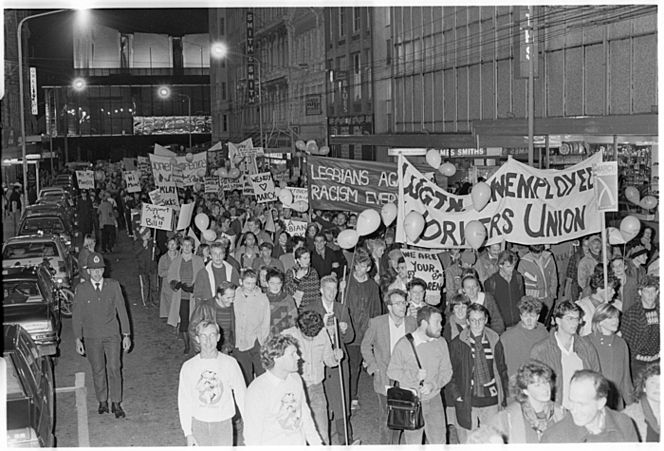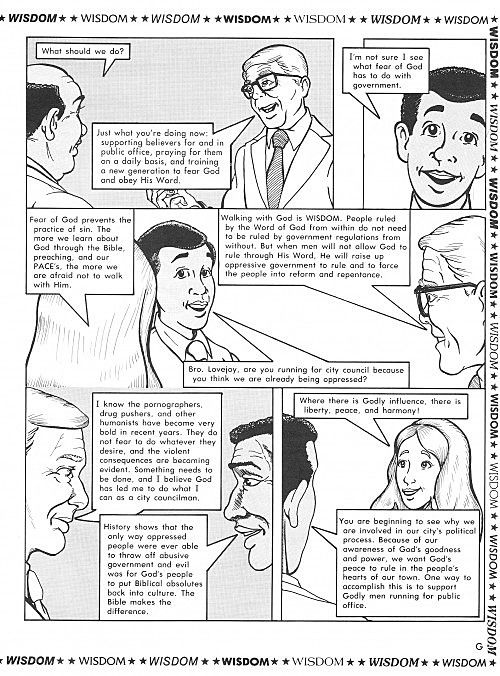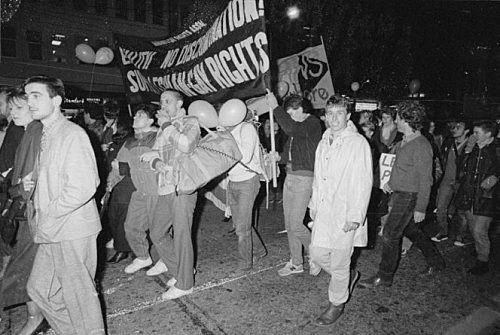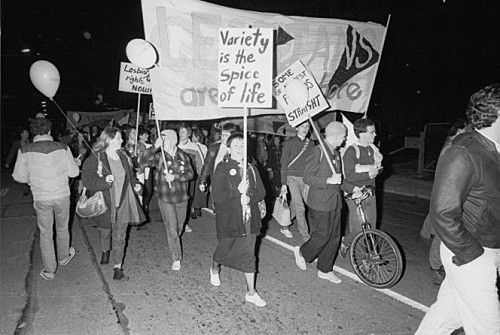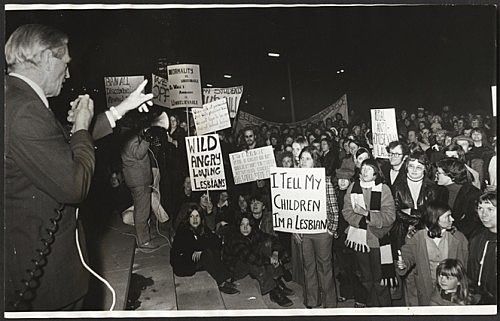Love Your Neighbour (Not Like That): How A Christian Education Taught Intolerance
Ahead of tonight's historic final reading of the Marriage Amendment Bill, Paul Gallagher looks back at the world of private Christian education packages he came from and asks why the church remains so implacably hostile to other people's happiness.
[caption id="attachment_6391" align="aligncenter" width="500"] A dog joins a demonstration in support of the Homosexual Law Reform Bill, 1986. The legislation overcame significant political opposition to remove homosexual sex from the Crimes Act.[/caption]
The Marriage Amendment Bill, aiming to legalize gay marriage in New Zealand, looks set to pass at its third and final reading today. Homosexual law reform has long been an issue of debate it New Zealand: it’s been something passionately debated for decades and is marked by the fervent opposition towards same-sex marriage by churches.
Even at this advanced stage, some MPs considering the conscience vote on the Marriage Amendment Bill are displaying a bewildering level of disengagement. If only the spectre of National backbencher Kanwaljit Singh Bakshi asking a gay couple in a select committee“who would play the husband and who the wife” if same-sex marriage became a reality was the stuff of subtle satire. It was not.
Gerry Brownlee stated his renewed opposition was due to a lack of appropriate protections to people who aren’t comfortable marrying gay people in their premises. He then went on to say that, for him, it wasn’t an issue of rights equality: “I have concluded that this is a group of people who for centuries, if not longer, said respect us for being different – and are now saying, treat us the same.” He then said, “I respect their difference.” You might have expected him to complete the cop-out by saying, “But hold on, I like gay people – some of my best friends are gay.”
I’ve sat through the Select Committee hearings on the Marriage Amendment Bill. The antagonistic views of lobby groups like Family First are expected and unsurprising. But there was, in my view, a disturbing lack of humility and grace displayed by those representing major churches.
People often think of church congregations as a bunch of upstanding citizens - readily tending to issues of public importance like poverty and social services. However, churches also act to defend their own moral frameworks – sometimes against the grain of popular opinion. It creates an intriguing dichotomy.
I grew up Christian. I was taught that ‘God is love’, that ‘All God’s children are created equal’, that you were meant to ‘love your neighbour’ by being humble and acting with grace. But these messages are incongruous with the reality of what many church elders believe. While there have been church figures that have come out to support the Marriage Amendment Bill – such as Margaret Mayman of St Andrew’s on the Terrace – there exists a massive tide of church-borne opposition against the move, and it might help to offer some context around that.
For four years I went to a small private Christian school in Wellsford where the predominant curriculum was called A.C.E – Accelerated Christian Education. It was a self-learning style system, imported from a company established in Nashville, Tennessee in 1970. Each student would manage their own learning, working through 30-40 page booklets in each subject. It is popular among parents (not all of whom are necessarily Christian) who prefer home schooling for their children. A.C.E has been taught in New Zealand for around 20 years - and when I was in the course, I was aware of at least a dozen schools in the North Shore and Northland area that implemented its teachings.
[caption id="attachment_6393" align="aligncenter" width="500"] An example of A.C.E's teachings.[/caption]
I was asked recently by the school to testify to the benefits of my time there for their printed advertising material. I obliged by speaking positively about A.C.E’s English, Etymology and Algebra courses. I also supported the sense of responsibility that the curriculum instils in students. I stand by my quotes, but note that I wasn’t asked to offer my thoughts on its more negative aspects.
A.C.E was simply laughable in terms of science, literature and history. Moreover, as a method of social engineering it was pernicious, linking correct answers in its core curriculum with Biblical ideals so that you would espouse religious ideas in order to pass each paper. A.C.E also limited students to correct answers in a black and white model of perfection, so that it shunned the encouragement of questions – let alone critical thinking or evaluation.
Part of A.C.E’s more questionable side was the set of biblical comic strips accompanying each booklet. Students followed a range of characters – such as Ace, Pacey and Sandy – from a young age towards their graduation from their A.C.E school. At beginner level, the comics taught simple principles related to sharing, fairness and unselfishness. However, as each year progressed they moved on to more hard-edged fundamentalism and made a complete about-turn from inflective ethics to a reactive societal viewpoint. What it ended up teaching were ideals of intolerance and self-righteousness. ‘Bold humanists’ were equated with ‘drug pushers’ and ‘pornographers’. Godly men had to take it upon themselves to intervene and correct the secular political process.
Another aspect of the A.C.E. curriculum was a litany of blatantly questionable ‘factual’ statements that underlined its bias toward Christian beliefs. Its history papers recounted how God blessed the United States as the greatest nation on earth, while Israel’s military victories in conflicts like the Six Day War were a sign of God’s will. It got worse than that. As late as 1998, a social studies booklet had this to say about apartheid:
Although apartheid appears to allow the unfair treatment of blacks, the system has worked well in South Africa .... Although white businessmen and developers are guilty of some unfair treatment of blacks, they turned South Africa into a modern industrialized nation, which the poor, uneducated blacks couldn't have accomplished in several more decades. If more blacks were suddenly given control of the nation, its economy and business, as Mandela wished, they could have destroyed what they have waited and worked so hard for.
A biology course argued in support of the existence of the Loch Ness monster, suggesting that it could be a plesiosaur. It was part of a strange strategic attempt to disprove the theory of evolution.
Of course, A.C.E is just a tool, not a belief system in itself. It's something that simply illustrates the view of some modern Christian groups, the influence they’ve had on young people, and that they are trying to have on local and central governance.
*
A couple of weeks ago I had the privilege of speaking at my sister’s wedding in Cheltenham Beach near Devonport, in front of a large group of family friends – many of whom hold a conservative Christian outlook. Mine was intended to be a humorous and light-hearted speech, but I spoke briefly in support of gay marriage:
... but love isn’t enough for marriage is it? We currently live in a country that legislates against love. There are incredibly loving people in New Zealand who simply cannot get married if they want, and while the Marriage Amendment Bill is looking to legalize gay marriage in order to fix that problem, currently the law discriminates against them – despite the fact that all people should be treated as equals before the law.
I knew my opinion would get a reaction, and that’s why I made the comments – but as the night wound down and people began to leave, a few old friends approached me. These people had been the elders of my childhood community, people who I was taught to respect. Some of them were those who helped set up the Christian school I attended, where A.C.E was the chosen curriculum. One man shook my hand before pretending to punch me repeatedly in the stomach, saying that parts of my speech were “marginal mate, marginal”. Another said that he didn’t like my speech, but then patronisingly mentioned in a forgiving tone that it was okay because “I still like you”.
The basic argument of why Christians disagree with the idea of same-sex marriage is a pretty easy one to understand. Though there's a lot about what marriage is (a lifetime union between a man and a woman), the Bible doesn't go to the same lengths to say what it isn't - so same-sex marriage isn’t something explicitly addressed within its teachings. However, homosexuality certainly is. Same-sex relationships are condemned outright as being immoral and an unnatural sin. The Book of Leviticus defines homosexual sex as an abomination and a detestable sin, while Romans states that homosexual desires are shameful and indecent. First Corinthians declares homosexuals to be unrighteous people who will never inherit the kingdom of God. The message is clear: if homosexuality is decried within Biblical teachings, then gay marriage – although not covered – would certainly not be condoned in any way.
It’s obvious that there is a normative understanding within Christian circles that same sex marriage is abhorrent and not of God’s will. But is there room for confusion there? Are there grey areas? There is a Gordian Knot of hypocrisy and inconsistency within the Christian arguments around gay marriage. Some of the submissions on the Marriage Amendment Bill have reminded me of a satirical cartoon in the New Yorker last year: “God has heard your prayers, and they are really starting to creep Him out.”
A basic Biblical canon is the Ten Commandments, inscribed in the books of Exodus and Deuteronomy, which include at least two principles that are widely known by people of all backgrounds – religious or otherwise. And so they should be - ‘Do not murder’ and ‘do not steal’ are great rules, akin to paint-by-numbers ethics. But if murderers and thieves can marry, why is it that gay people cannot? That rhetorical question is not intended to equate homosexuality with killing and stealing – but it points out an obvious inconsistency. On a base level Christians object to gay marriage as they perceive homosexuality to be a sin. But according to the Bible, all people are sinners. But currently all people of a consenting age can marry. Unless they’re gay. Because they’re sinners, apparently. Like all people are. There’s equality in sin, but not in marriage.
Another claim offered by churches is that gay marriage would undermine the sanctity of marital commitment and would leave children confused due to having two mothers or two fathers, when parenthood is meant to reflect ‘true’ femininity and ‘true’ masculinity. It’s a befuddling thing to consider. I would suggest that in weighing the pros and cons of gay marriage, structuralists in the conservative camp might be able to see that more people being married might be a positive thing. It’s illogical to assume that more marriages would lead to less social ‘harmony’, especially considering the high failure rates of heterosexual marriages in much of the world. There are already countless children with step-fathers and step-mothers – as well as mothers and fathers. There are also countless children missing one or the other. The social dynamic would not be substantively changed.
Perhaps, to adopt Gerry Brownlee’s point, the churches should be able to have their castles. As an act of compromise, they could choose not to accept gay couple into their churches for marriage ceremonies. It would be to the detriment of the church in terms of lost economic revenue and social capital through community connection, but it could be their choice. A church's refusal to marry gay couples could even be wholly discriminatory, but one might imagine that most gay couples would not be clamouring to be embraced in the bosom of that congregation anyway.
Throughout history, we’ve seen too many churches rail against movements pushing for women’s rights and racial equality (to the credit of many others, they’ve tried to act as a counter-hegemonic force – the Church League for Women’s Suffrage, the South African Council of Churches, the First Baptist Church in Montgomery, Alabama). Modern attitudes have improved, but it hasn’t impinged or impacted on people’s ability to be racist or sexist – regardless of how despicable such behaviour is. Racism and sexism still exist. That isn’t a defeatist comment, but a realistic view of the freedoms of democracy. Homophobia and intolerance won’t go away if the Marriage Amendment Bill is passed. In a democracy, people have the freedom to believe what they like. It’s wonderful that churches even have the opportunity to object to the Marriage Amendment Bill in the first place. But while they get to enjoy democratic values, they believe that gay people shouldn’t enjoy the same privileges.
Perhaps it’s just another play on the old parlance that ‘possession is nine tenths of the law’. Some Christians want to protect marriage as an institution because they believe it is something ordained by God, for them. The ‘marriage-existed-before-the-state’ argument is all well and good, but it somewhat misses the point - as the current debate is around an adjustment being made to a piece of the state’s legislation on marriage. In this context, is marriage even a religious matter? No, it’s of legislative and legal concern. And in any case, the big-picture Marriage is something separate from little-picture marriage. Christian couples opposed to gay marriage have every right to be concerned about their own marriages. But what right do they have to judge others’ relationships – homosexual, heterosexual or otherwise?
Caught between a rock and a hard place, moderate conservative values are left untenable. My own father recognises that he’s in a tight spot, where his church is considering allowing gay people to serve in the church hierarchy – something that he’s uncomfortable with due to Scripture. But on the other hand, he says he’s perfectly fine with people being gay. There is a ridiculous situation where gay people are welcomed into some church congregations – but they just aren’t able to take leadership positions or be married in that environment. They’re allowed to watch on, but they can’t participate in all aspects of the church. If a church as an institution depends on the premise of expanding its flocks, of being able to expand its influence and resources, then this is no way to do it.
I’m aware I can be criticised as a hypocrite for being intolerant of other people’s intolerance. Don't get me wrong - I love the fact that people have the freedom to believe what they want. But I still struggle to reconcile it. It is not in my nature to proselytize on issues of personal belief, but I’m staggered that some churches - collectively, or through the efforts of individuals - cannot seem to remember their own Christian values of sharing, tolerance, fairness and unselfishness.
When I was around 11 years old, my church youth group held a service near Mangawhai, where I was required to offer a short talk on the idea of ‘faith’. In the Bible, one of the core illustrative stories highlighting the idea of faith is the conquering of Jericho by the Israelites, depicted in the book of Joshua. It was a strong fortified city with imposing defensive walls that could not be penetrated through typical military means. But as the story goes, with the will of God the Israelites marched around the city for a period of seven days blasting loudly with trumpets and other instruments, causing the walls to crumble on the seventh day. The city was then overrun and every man, woman, child and animal was slaughtered in the name of the Lord – except for a family who had hid Israelite spies. It’s an example widely used by churches to argue that you will be victorious if you have faith in your beliefs. Well, as long as they’re Christian beliefs.
Even if the Marriage Amendment Bill is not passed into law, it will not be a debate that goes away. In simplistic terms, let me transpose a clumsy Biblical metaphor to point out what might happen without marriage equality. While I can just imagine the risible shudders of those holding tight to their literal interpretations, outside the fortified walls of conservative Jericho there is marching a fantastically colourful yet wholly normal parade in support of gay marriage.
The walls will come down, inevitably. This should not be an impossible conversation, let alone an impossible conversion - the church doesn’t hold a monopoly on love.
